- India
- International
Big Picture – 103 hooch deaths: The next of kin
The men drank every evening — pouches of hooch that they would gulp down at addas in Lakshmi Nagar, a slum in a north Mumbai suburb. But when 103 of them died last week, in one of Mumbai’s biggest hooch tragedies, they left behind their wives, nursing bruises far beyond the physical.
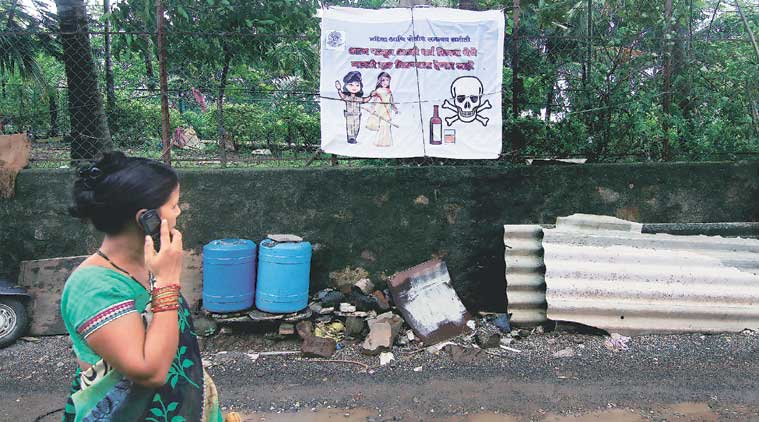 A poster put up by the Mumbai Police that warns of the dangers of drinking illicit liquor (Source: Express photo byAmit Chakravarty)
A poster put up by the Mumbai Police that warns of the dangers of drinking illicit liquor (Source: Express photo byAmit Chakravarty)
A strange silence has engulfed the muddied main road and the moist lanes leading off it. The only sounds are of muffled strains from television sets and the spattering of rain on the narrow rat-infested lanes of Lakshmi Nagar, a slum in lower Kharodi village, in Malwani, a northern suburb of Mumbai.
Here, behind curtains serving as doors, almost every home has lost a male member to a 100 ml plastic pouch of clear liquid. Until a week ago, neighbours listened in on each other as drunk husbands and their wives quarreled, their abuses filtering in through the corrugated aluminum sheets that separate these matchbox-like hutments.
“Aadmi log mar gaye, ab chilla-chot nahin hoti (the men are dead, there are no fights now),” says Narangi Ragpaksa, 45, talking of the women left widowed after 103 men died between June 18 and June 22, drinking what was initially believed to be spurious liquor, but is now revealed to be methanol, an industrial solvent, mixed with water, with cardamom added for flavour.
This week, the Maharashtra government announced a compensation of Rs 1 lakh for families of those who died. The Mumbai Police’s Crime Branch has arrested nine people, including the chief supplier of methanol, Kishore Patel, and the local retailers whose homes in
Kharodi doubled as drinking dens or addas. Maharashtra Chief Minister Devendra Fadnavis has gone ahead to push for capital punishment for all the accused.
***

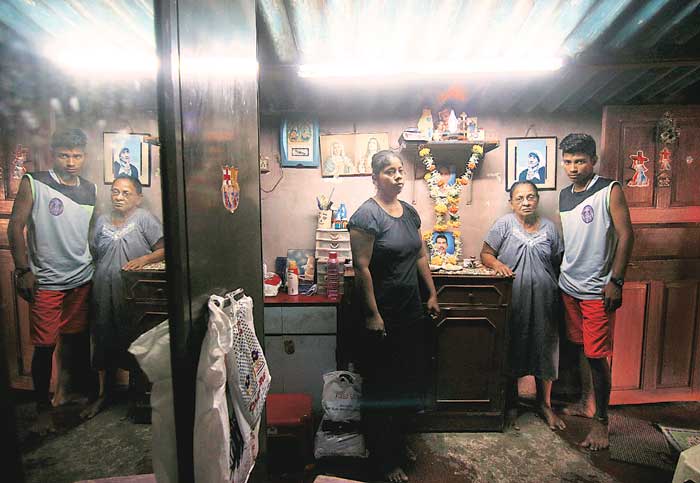 Sarika Gowd’s husband spent over Rs 1,000 a month on hooch (Source: Express photo by Amit Chakravarty)
Sarika Gowd’s husband spent over Rs 1,000 a month on hooch (Source: Express photo by Amit Chakravarty)
In her dingy 50-square-foot dwelling, boxed in by aluminum sheets on three sides and a brick wall on the fourth, Sarika Gowd is rummaging through a brown iron cupboard for photo identification documents of her dead husband. “I kept telling him to apply for a ration card. The police are asking for proof to show he is…was… my husband,” says Gowd, a mother of two.
With two children – daughter Laxmi, 11, and son Babu, 6 – to care for, the Rs 4,000 a month that Gowd earns as a civic sweeper will now be stretched. Her husband, Ramesh, also a sweeper, managed another Rs 4,000, though he spent over Rs 1,000 on haath bhatti or hooch and sometimes beer if he had extra cash.
While Gowd has a PAN card, her surname is that of her father’s and she has no way of proving that Ramesh was her husband. “I am making daily rounds of Malvani police station. That compensation is my only hope to survive,” she says.
It is 9.30 on a rain-battered June night. Rajpaksa, whose husband “fortunately or unfortunately survived”, says that men in Lakshmi Nagar have sobered up after 103 among them died in a span of four days. They now smoke beedis out on the mud roads or watch TV in their homes. There’s no talk of alcohol or addas in the slum, at least not under the watchful gaze of a poster put up by the Mumbai Police that features a glass filled with an amber liquid, a grinning skull and crossbones.
A week ago, while wives would be busy positioning buckets to collect the water dripping from leaking roofs, the men would venture out to Raju Pascar alias Raju Langda’s two-room dwelling to gulp down glasses of hooch, for Rs 10 a pouch. Some would head to the one-room home of Mamta Yadav.
A large number of those who died are believed to have bought the diluted methanol from these two addas and another one at Inaswadi, in Upper Kharodi village. Since June 20, when the police detained the two and shut down their businesses, the two hooch addas in Lakshmi Nagar have had no visitors.
***
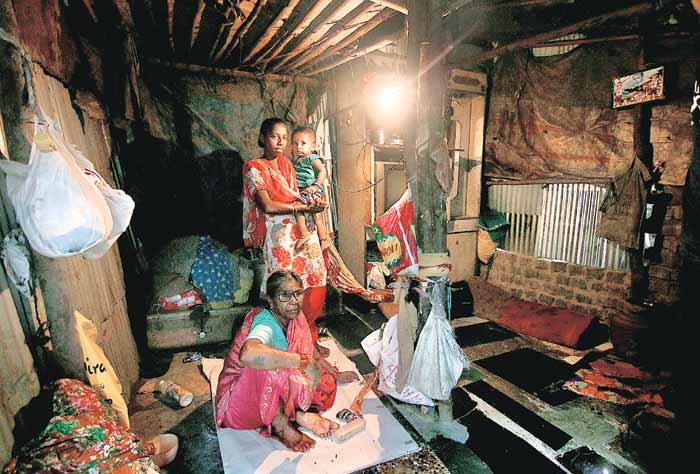 Pinky Kamane says she and her husband had planned to buy a house of their own, but “that won’t happen now” (Source: Express photo by Amit Chakravarty)
Pinky Kamane says she and her husband had planned to buy a house of their own, but “that won’t happen now” (Source: Express photo by Amit Chakravarty)
Varsha Yadav, 29, is still young and “can marry again”, older women in the neighbourhood tell her. “But life is over. I will now just look after my two children,” she says, adding she has deposited the compensation money in her bank account. After the Brihanmumbai Municipal Corporation razed her hut near the Gaondevi temple in 2013, she had built a shanty made with corrugated sheets in Lakshmi Nagar and isn’t sure how long she can live her.
The stitch on her forehead is still sore – it’s from a beating she got from her husband Vinod on June 18. That night, he had stayed at Mamta’s adda till 11 pm, downing three glasses of hooch. On June 19, he succumbed to methanol poisoning.
The assaults are now over and Varsha does not know whether to be happy or sad about that. “When I refused to give money to buy daaru (alcohol), he would still drink and pay Mamta later. Every night, he would return home, beat me up and then sleep. I never showed my scars to anybody,” Varsha murmurs, while her children, aged 10 and eight, sleep on her lap.
Varsha says she would frequently run after her husband to Mamta’s adda, begging him not to drink — and he would abuse her publicly. “I used to wait for him to eat dinner while he drank,” she says bitterly.
Pinky Kamane, 21, recalls the beatings her now dead husband, Harish, got from his family when he announced his decision to marry her. That was three years ago and the 25-year-old Harish’s family had frowned upon the union — an upper caste Marathi boy dead-set on marrying an orphan. “His parents didn’t like it when he spoke to me. So we would meet in a garden some distance away from our homes,” says Pinky fondly.
Harish worked both as a driver and a manual labourer, carrying heavy loads on his head and back. “When he didn’t drink, his arms and legs trembled and his back hurt. He told me that he needed to drink to numb the pain and sleep,” Pinky says.
Without the weekly Rs 9,000 that Harish brought in, Pinky now has to sustain herself and her two-year-old son Om on the Rs 4,000 that she earns a month working as a domestic help in Malwani. Besides, there are monthly bills – house rent (Rs 1,000), electricity charges (Rs 300), water at Rs 30 a gallon and kerosene for Rs 60. “I have received a cheque of Rs 1 lakh, but when the time comes for Om’s education, I don’t know if this money will be enough,” she says. “Harish and I had planned to save enough money to buy a house of our own. That won’t happen now.”
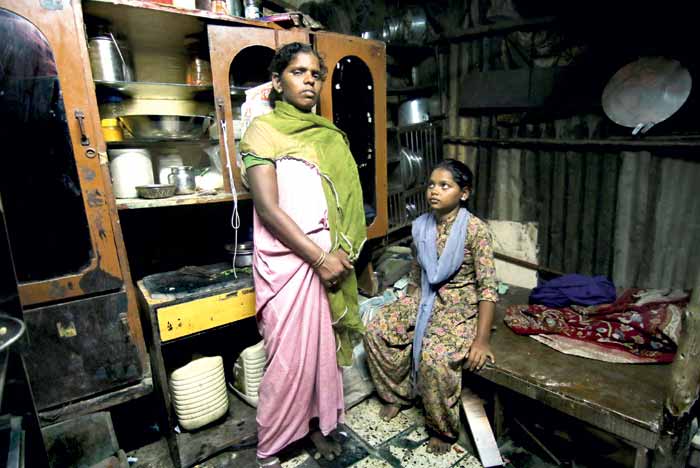 While Naseem Ansari’s husband lay dying in hospital, their hut was blown away in the rains (Source: Express photo by Amit Chakravarty)
While Naseem Ansari’s husband lay dying in hospital, their hut was blown away in the rains (Source: Express photo by Amit Chakravarty)
Just outside Lakshmi Nagar slum, Naseem Ansari is speaking to two men who have just pulled up in a grey Toyota Innova. “Those men wanted to know why I was rebuilding my house,” says Naseem, her seven children prancing around her. Behind her is what is left of her home – a few bamboo sticks dug into the ground, once the columns that held her world together.
As Naseem’s husband, Abdul Ansari, lay dying in Shatabdi Hospital last week, their hut was blown away in the rains. The 35-year-old, who works as a domestic help in a few chawls nearby, says, “We spent the last eight days living in the homes of my employers, but they won’t take us in forever.”
Naseem says Abdul, 44, assaulted her and their 18-year-old daughter Rabiya whenever they hid his alcohol from him. “On Wednesday, he couldn’t find any work so he stayed at home. Mamta came home and asked him why he hadn’t come to her adda to drink that day. When my father told her that he didn’t have any money, she gave him a bottle of alcohol and told him to pay her later,” says Rabiya.
Abdul, who on Wednesday night first complained of a burning sensation in the pit of his stomach and gradually lost his eyesight, had, earlier in the day, thrashed Rabiya when she wouldn’t give him his drink. “I could never do anything to stop him from drinking,” says Naseem.
***
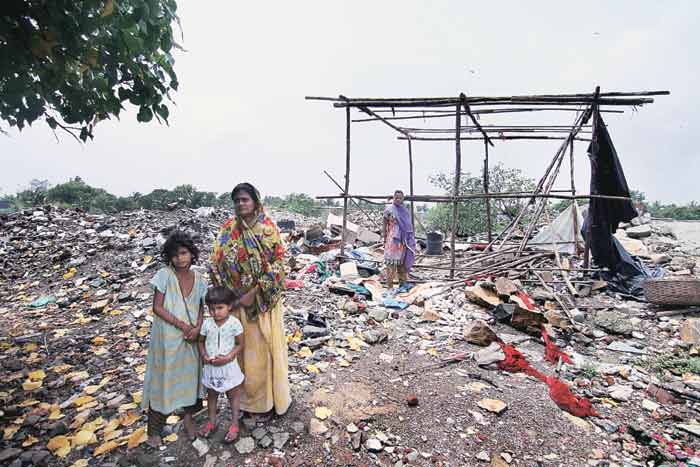 Selly Rodericks with her children at their home in Inaswadi slum. Her husband was among the four people who died here (Source: Express photo by Amit Chakravarty)
Selly Rodericks with her children at their home in Inaswadi slum. Her husband was among the four people who died here (Source: Express photo by Amit Chakravarty)
At Inaswadi slum in upper Kharodi, which owes its name to its location up a hill, Selly Rodericks does not know who to blame for the death of her husband Aubrey. Donald Patel, one of the seven people arrested, is a relative and worse, godfather to their son Ozi.
Unlike in Lakshmi Nagar, only four men died in Inaswadi, leaving the Rodericks family far removed from the hysteria that had gripped the slum below the hill. Selly, 35, only realised the scale of tragedy when she wheeled Aubrey into Shatabdi Hospital on Wednesday. “There were so many men being brought in every two minutes and the hospital staff said everyone was critical,” she says.
Aubrey, 40, was finally taken to Nair Hospital in South Mumbai. “He screamed for his mother. ‘Mujhe paani do, mummy, main mar raha hoon,’ those were his last words,” says Selly.
‘He is not dead, but he is of no use now’
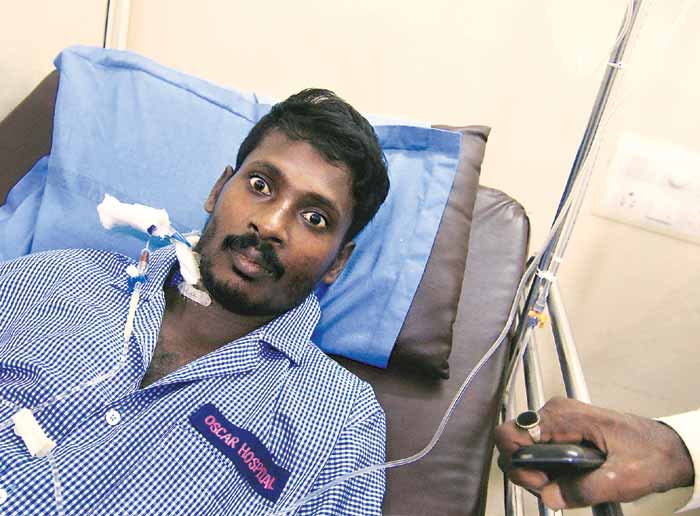 Laxman Dhotre has lost his sight. The family now plans to leave Mumbai (Source: Express photo by Amit Chakravarty)
Laxman Dhotre has lost his sight. The family now plans to leave Mumbai (Source: Express photo by Amit Chakravarty)
Laxman Dhotre, 31, lost vision in both his eyes two days after he drank illicit hooch. He is now confined to a bed at Oscar Hospital in Kandivali. “This is worse than death,” says his wife, Gaurama Dhotre.
Laxman is among three other victims who lost their eyesight to the killer hooch. “When I woke up last Thursday, my stomach was burning. I had a headache and my hands and legs were trembling. That’s when my wife heard that people around us were dying. It was like a horrible dream,” Laxman says. His brother-in-law Ashok Dhulekar was among those who died.
A construction worker, Laxman had stopped working when the rains hit Mumbai earlier this month. Idle at home and with his wife away working as a domestic help, he says he drank heavily. “I usually drink five pouches a day for Rs 50. That day, luckily, I decided to drink for just Rs 10,” he says.
The family – his wife, three children – now plans to shift to their native village in Solapur. Laxman’s father Basanna Dhotre claims he never knew his youngest son was an alcoholic. “He is not dead, but he is of no use now. How will he look after his family?” he says.
***
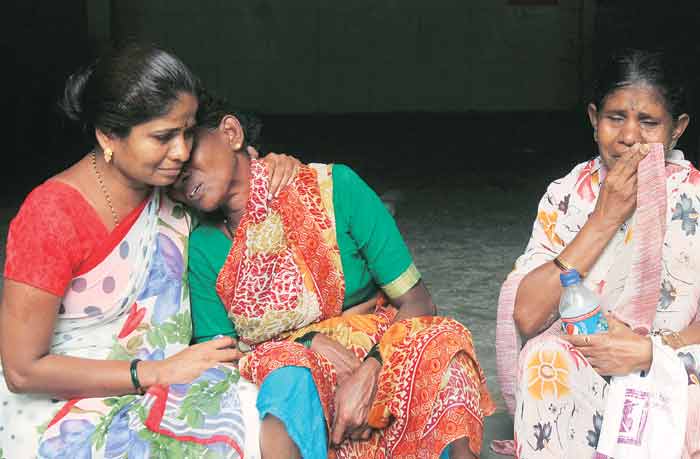 Between June 18 and 22, 103 people died after drinking illicit hooch, leaving behind families to pick up the pieces (Source: Express photo by Amit Chakravarty)
Between June 18 and 22, 103 people died after drinking illicit hooch, leaving behind families to pick up the pieces (Source: Express photo by Amit Chakravarty)
On June 19, Aadhwesh Singh woke up at 6 am. It was dark outside the rain-battered window so he dozed off again. At 8 am, his co-workers woke him up. This time, it was pitch dark. Confused, he rubbed his eyes. “Pehle sab dhundla tha, phir kuch nahi dikha (Initially it was hazy, then I could see nothing),” recalls 55-year-old Singh, a driver.
That fateful day, as the lane outside his home erupted in the wails of women, Singh’s neighbour asked him whether he had had hooch the previous night. Singh was rushed to Shatabdi Hospital and then to KEM Hospital in Parel. Now in the hospital’s Medical Intensive Care Unit, he keeps telling his younger brother, Vishwanath Singh, “Kabhi mud ke nahi dekhunga daaru ko (I will never drink again).” But the damage has been done. According to Dr Avinash Supe, the hospital’s dean, Singh may have suffered a permanent loss of vision.
Vishwanath says Singh was a heavy drinker even before he came to Mumbai from Gorakhpur, Uttar Pradesh, 18 years ago. In Kharodi, he still drank three to four times a week. After he is discharged, he will now be taken back to Gorakhpur. “There is no place for him in Mumbai now. He can’t drive anymore,” says Vishwanath.
Apr 19: Latest News
- 01
- 02
- 03
- 04
- 05






































